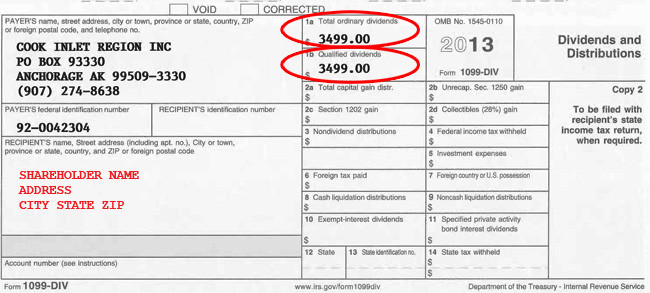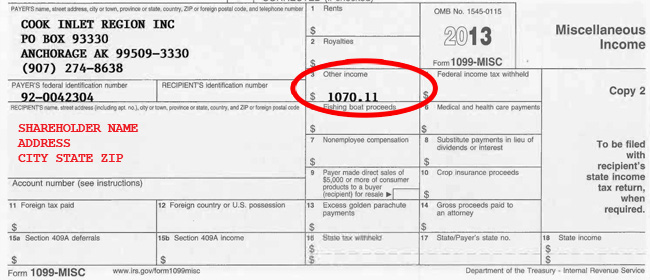
CIRI mailed IRS 1099 forms to all shareholders for the 2013 tax year on January 31, 2014. Some shareholders may receive a second 1099 form if they also received 7(j) payments and/or shareholder prizes. The 1099 forms reflect payments including:
- Quarterly dividends (reported in boxes 1a and 1b on Form 1099-DIV)
- CIRI Elders’ Settlement Trust distributions (reported in boxes 1a, 1b and 3 on Form 1099-DIV)
- 7(j) resource payments (reported in box 3 on Form 1099-MISC)
- Shareholder prizes (reported in box 3 on Form 1099-MISC)
CIRI paid a total of $34.99 per share ($3,499 per 100 shares) in 2013 quarterly dividends. The Elders’ Benefit Program and the Elders’ Settlement Trust both paid $1,800 ($450 per quarter) to qualified Elders. These distributions are reported on Form 1099-DIV in box 1a (ordinary dividends) and box 1b (qualified dividends).
The amount reported in box 1a on the 2013 Form 1099-DIV is the total of all taxable

distributions CIRI paid in 2013 for quarterly dividends and Elders’ distributions. Box 1b shows the same amount and may qualify for a reduced tax rate. If you have held your shares for less than one year, please consult your tax advisor regarding the proper tax treatment of qualified dividends.
If you inherited new shares during 2013 you may have an amount reported in box 3 (nondividend distributions) on the 2013 Form 1099-DIV. Please consult your tax adviser for the appropriate treatment of distribution totals reported in box 3. In some circumstances, depending upon an individual’s tax “basis” in their stock, some or all of the box 3 total could be subject to tax.
Distributions received in 2013 from the Elders’ Benefit Program are also reported by CIRI on Form 1099-DIV, both in box 1a (ordinary dividends) and in box 1b (qualified dividends). However, payments made from CIRI’s Elders’ Settlement Trust had both a taxable and nontaxable component. The taxable distributions are reported on Form 1099-DIV, both in boxes 1a and 1b, and the nontaxable portion is reported in box 3 (non-dividend distributions). If you received all four of the payments made from CIRI’s Elders’ Settlement Trust last year, $1,580.15 is reported in boxes 1a and 1b, and the remaining $219.85 is reported in box 3.
At-large shareholders received a $10.7011 per share (or $1,070.11 per 100 shares) 7(j) resource revenue payment in 2013. If you are an at-large shareholder, your 7(j) payment is reported on a Form 1099-MISC in box 3 (other income). The resource revenue payment derives from resource sharing among the 12 regional corporations as required by the Alaska Native Claims Settlement Act. Your 7(j) payment appears on a different form because resource revenue payments are not dividends and are not considered investment income. ANCSA requires that resource revenue be paid to village shareholders’ village corporations, so that CIRI does not report these payments as individual shareholder income. CIRI reports payments made in 2013 to shareholders for prizes or awards on Form 1099-MISC in box 3 (other income).
Remember, it is your responsibility to accurately report your CIRI income on your tax return. Also, please note that the proper IRS forms and schedules to use when completing your tax return may vary depending upon the types of payments received from CIRI. For example, as stated above, the 7(j) payments CIRI makes to at-large shareholders are reported on a Form 1099-MISC, and IRS instructions stipulate that IRS Form 1040A is not the proper form to use if a Form 1099-MISC was received. CIRI cannot provide tax advice and shareholders are encouraged to consult with a tax advisor regarding individual circumstances and applicable federal and state tax requirements.
REMINDER
IRS instructions stipulate that IRS Form 1040A is not the proper form to use if a Form 1099-MISC was received.



